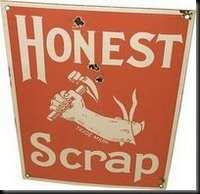 Episcopalians across the United States have voiced wonder at just how far a Diocean Bishop of the church can go when deciding to abandon the church. For a Bishop to just move on without the church assets seems to be a concept of the past as Bishop David Shofield (former Bishop of the San Joaquin Diocese in California) clearly shows.
Episcopalians across the United States have voiced wonder at just how far a Diocean Bishop of the church can go when deciding to abandon the church. For a Bishop to just move on without the church assets seems to be a concept of the past as Bishop David Shofield (former Bishop of the San Joaquin Diocese in California) clearly shows.
Shofield departed (on paper only). After front-loading the politics for a couple decades, his final act was to stuff church property and financial assets--the whole shebang--into his lunch box and scamper off to the Province of the Argentina-based Southern Cone where he is free to discriminate against women and gays. With the new requirements of GAFCON's FOCA doctrine (which the So. Cone adopted), the requirement for use of the 1662 prayer book is a little post note but given the fracas over the 1979 Prayer Book (U.S.), it exemplifies just how far back this problem goes.
To say this did not go over well with faithful Episcopalians in the Diocese of San Joaquin is an understatement. But what seemed to perplex so many, there and elsewhere, is why nothing was done to prevent the act from occurring in the first place. It was hardly like the train light could not be seen from the other end of the tunnel.
Members of Calvary Episcopal Church in Pittsburgh, Pennsylvania, however, have reacted with vigor in protecting their church's assets from "quitter" Pittsburgh Bishop Robert Duncan who is facing charges of abandonment this fall by the U.S. House of Bishops. Calvary has been pro-actively protecting their church for several years in various ways including through the court. Duncan's words and actions have made his intentions to exit TEC with the church assets quite clear.
There is a certain love, respect and brotherhood among the Bishops of TEC, no question. One can only wonder, though, if that love and brotherhood has rendered many a diocese helpless while the church and the Title IV Review Committee send coded messages that lay members can hardly understand. The Committee agreed that Duncan had formally abandoned the church, but did not give Presiding Bishop Katharine Jefferts Schori their 3-vote nod to inhibit. To inhibit Duncan would have prevented more collateral damage.
Given his plan of action to depart which is hardly a secret, and the finding he had abandoned the church by the Title IV Committee, many of us have to wonder WHY the Bishop is allowed to continue in his role (inhibition would have stopped this) until that finding of abandonment is voted upon by the House of Bishops. Are the lay people in the pews so unimportant that they deserve to be caught in the middle like this? This from a church which alleges to value their lay members and their participation in Episcopal process? One can only wonder.
Read more here.
How do we find middle ground?
6 years ago










|